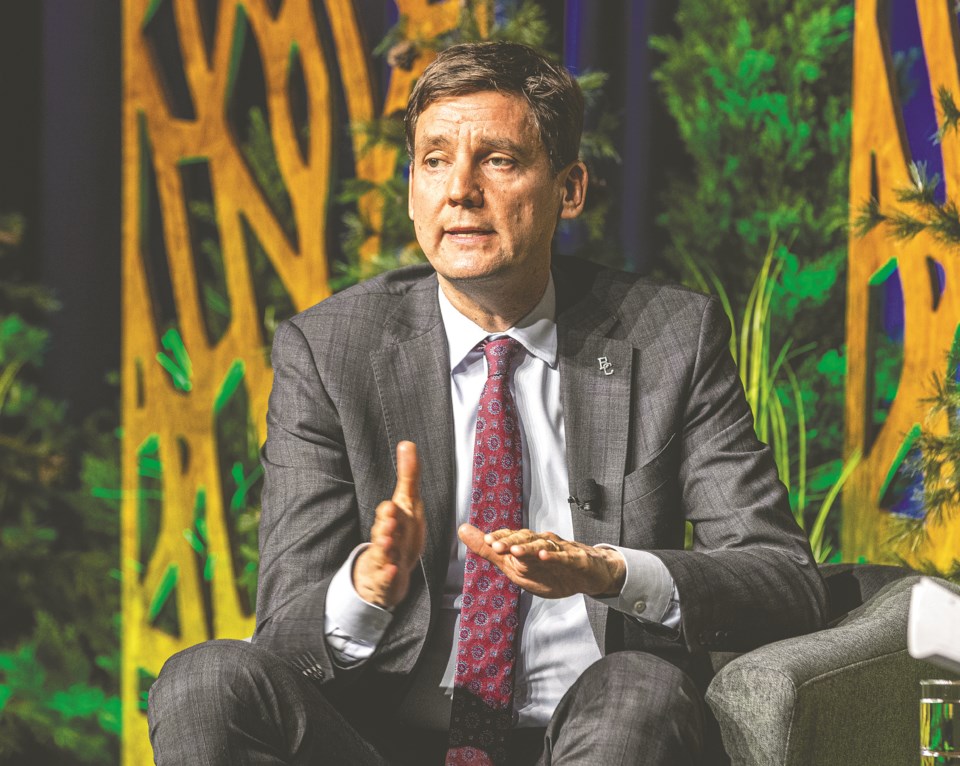Premier David Eby said a delegation from the City of Prince George advocated for public safety enhancements while visiting the BC legislature on Thursday, May 1.
Eby’s remarks came after Prince George-Mackenzie Conservative MLA Kiel Giddens raised the issue of secure psychiatric care in northern BC twice during question period earlier in the week. One of those occasions was when the city's Standing Committee on Intergovernmental Affairs was present in the visitors’ gallery.
During a news conference at the legislature on May 1, Eby was also asked repeatedly about his government’s response to the deaths of 11 people at Lapu-Lapu Day festivities in Vancouver, after a motorist drove into a crowd.
The man accused of killing eight of those individuals had multiple mental health-related interactions with police in recent months, according to the Vancouver Police Department.
A reporter with Global News noted that several municipal governments across BC have passed motions calling for increased provincial support for mental health and addictions services. The reporter asked whether Eby planned to meet with local leaders or the Union of BC Municipalities (UBCM) to address what they describe as chronic underfunding.
Last October, Prince George city council passed a motion urging the province to build an involuntary psychiatric secure-care facility in northern B.C. It also backed a petition launched by Dr. Barb Kane, psychiatric lead at University Hospital of Northern BC, calling for the province to address what she described as a critical lack of access to high-level psychiatric care in the region.
“I was actually talking to the Union of BC Municipalities and municipal leaders,” Eby said May 1. “The City of Prince George was just here at the legislature. That led to significant investments around public safety in the budget.”
He said those investments include doubling police training slots at the Justice Institute of BC, special funding for police to address organized shoplifting and other "quality of life" crimes, additional support for peer response teams, funding for nurses to accompany police responding to mental health and addictions calls, and new involuntary care beds in Surrey.
Eby credited UBCM’s advocacy for helping the province plan and set up the involuntary care beds, with more to come.
“Many municipalities have stepped up and said, ‘We have a site; we would like you to locate beds in our community to provide this kind of care,’” Eby said. “I am grateful for that. It is that kind of co-operation between local governments and the provincial government that is going to help us get ahead of this problem and deal with it.”
Reached by text message later that day, Giddens said Eby’s reference to the Prince George delegation followed his raising of the issue during question period earlier in the week.
Giddens twice referred to Kane’s petition, noting it had been endorsed by the City of Prince George and 23 community partners.
On the first day he raised the issue, Giddens said there are only 45 acute care psychiatric beds combined across Terrace, Dawson Creek and Prince George. He added that patients needing forensic psychiatric care must be transferred to Kamloops, where only three such beds exist.
In response, Eby said BC's chief scientific advisor for psychiatry, Dr. Daniel Vigo, is working with mental health specialists from UHNBC and Lheidli T’enneh Chief Dolleen Logan “to identify solutions for additional mental health services in the north.”
Eby said the province previously centralized psychiatric services at facilities like the former Riverview Hospital in Coquitlam, but now aims to keep patients closer to home and their support networks.
The next day, Giddens said that despite government efforts, patients in crisis are still being released too early, posing risks to themselves and others. He added that the nearest forensic psychiatric bed for a potentially dangerous patient in Terrace is a 12-hour drive away in Kamloops — and only if a bed is available.
Giddens pointed to the Prince George delegation in the gallery and asked when the government would “move beyond meetings and platitudes and actually deliver secure psychiatric care that northern communities desperately deserve.”
“I thank the member for his advocacy for his community,” Eby replied. “I suspect he’s aware that our work there goes well beyond meetings and conversations. I look forward to being able to update him very soon.”
Looking up to the gallery, Eby added: “We’ve been working very closely with the City of Prince George, working with Chief Dolleen Logan, the mental health specialists, the hospital on adding additional beds, and I look forward to sharing more information soon.”


